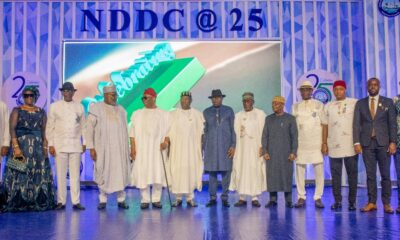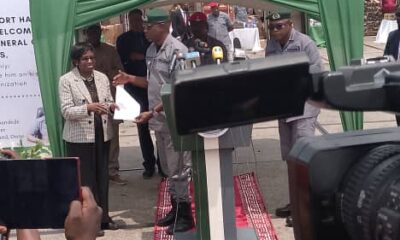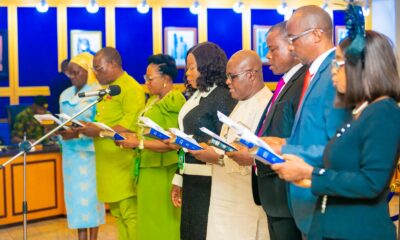Rivers
Don Faults Nigeria’s Educational System …Advocates Deschooling To Attain Educated Society Status
A lecturer in the Ignatius Ajuru University of Education (IAUE), Professor Edward Ezebuaghom Adiele, has faulted Nigeria’s educational system, saying it awards degrees without the awardees acquiring commensurate skills.
Speaking as the 55th Inaugural Lecture of the university on the topic, “Epidemiology of the Paralytic and Epileptic Nigeria’s Education System: Towards Epistemological Oriented Based Economy”, at the university’s auditorium, Professor Adiele accused universities of having anti-educational effect on the society by their “role in awarding certificates, diplomas and degrees without commensurate knowledge and skills by those who possess such certificates and degrees”.
According to the Professor of Educational Planning, “schooling is not the only means of acquiring education, hence associating education with schooling portends serious danger to the society.
“It reduces the chances of the citizens acquiring other forms of alternative education that can be acquired outside the school environment which are equally important for individual survival and contribution to societal development”
He stated that “the erroneously held idea about schooling and education also account for the reason society looks down on people who did not attend school, but have developed their potentials and talents through other forms of education.
According to him, approximating education to schooling also negates the fact that schools may not be the best place to produce the best craftsmen, artisans, businessmen, musicians, footballers, film actors and actresses that are badly needed for economic development.
“It is because of the wrong idea of taking schooling for education that every Tom, Dick and Harry wants to empty themselves into educational institutions even when they do not possess the requisite aptitude for higher education schooling”, he emphsised.
Professor Adiele noted that funding of education in Nigeria is another major challenge that is seriously responsible for the numerous ailments the education system is suffering from.
“Budgetary allocations to education, which on the average, has never exceeded 10 percent, does not show any seriousness on the part of government in Nigeria to provide education to the citizens when compared to other less endowed countries like Botswana, Lesotho, South Africa, Uganda, Ghana, Kenya, Tunisia and Morocco where budgetary allocations to education range between 19 and 20 percent”, he stated.
The university teacher continued that poor funding of education sector is responsible for poor production of quality manpower to meet the economic development needs of Nigeria.
“These daunting challenges place the education system at a crossroad and at most the system can best be described as paralytic and epileptic”, he said.
The 55th Inaugural Lecturer hinted that the academic curriculum does not take into cognisance the employers of labours’ need “and this has made it difficult for university graduates to fit into the world of work.
“The course content of most tertiary institutions in Nigeria lacks entrepreneurial contents that would enable graduates to become job creators rather than job seekers”.
In addition to the stated challenges faced by Nigeria’s education system, he also identified the role of strikes.
“The incessant strikes by tertiary institutions has also resulted in the production of half-baked graduates who are unemployable”, he stated.
While informing that Nigeria holds the world record of having the highest number of dropouts from school with 20.5 million out of school topping the list of 12 other countries, he hinted that the number may have increased further by now.
“The Nigerian school system has not been able to develop the individual into a sound and effective citizen. The country has remained in the status of a developing economy for the past 47 years because of obvious weak education system”, he emphasised.
He, however, stated that although the causes of the paralytic and epileptic education system are numerous, the Nigerian education system can still be salvaged through a holistic education.
Adiele asserted that the cure to the identified ailments lies within the education system itself.
He said it can be done “by overhauling the system and redirecting it towards epistemological (knowledge) oriented based economy, if at all the country is ready to address the inherent development challenges”.
To attain this, he advocated the imperativeness of a paradigm shift from the old orthodoxy of over reliance on schooling alone as a means of acquiring education, to opening the education market to include the non-formal structures such as apprenticeship schemes, trades and the use of practical skills as a means of certification of claims of knowledge acquisition.
“Any society that genuinely seeks education as a means of effecting national development must do so within the ambit of educational planning framework that is anchored on rational decisions that seek to domesticate the school curriculum to reflect the peculiar Nigerian environment, develop a sound educational information management system, the planning of the non-formal education sector and develop a sound framework for educational financing, and finally, increasing access and equity in educational provision”.
He urged educational planners and policy makers to wake up and assume their rightful position of planning the right education for national survival.
In his remarks, the Acting Vice Chancellor of IAUE, Professor Okechuku Onuchuku, who agreed that the educational system suffer paralytically and epileptically, stated that for anything to be considered educational, “it must transmit cultural heritage to younger generation, develop skills and contribute to nation building”.
He stressed the need to take education and research seriously for growth and to minimise wastage in the system.
Professor Onuchuku observed that the country is stagnated because Nigerians are more of consumers than producers and that the overdependent nature is why the foreign exchange rate is very high.
He stressed the need to deemphasise the importance attached to certificates and to encourage and promote informal education, job creation and trade to reduce the mismatch between graduates and industries and for development.
Sogbeba Dokubo
Rivers
Motor Spare Parts, Industrial Generators Dealers’ Union Swears Gets New Chairman in Port Harcourt
The Owhonda Dickson Motor Spare Parts and Industrial Generators Dealers’ Union operating in Ikoku Port Harcourt, Rivers state has sworn in Mr. Cyril Igbokwe, popularly known as Onyeoma Cy, as its new Chairman.
The brief swearing _in ceremony was held at the union office in Port Harcourt, last Wednesday
In his acceptance speech, Mr. Igbokwe expressed gratitude for the trust and confidence his members had shown in him, despite his perceived educational background compared to others. , “I feel very happy to be the chairman of this great union in this great market. I’m proud of my executives for demonstrating commitment and cooperation.” Notably, the executives raised over ?1 million for the inauguration ceremony within an hour.
The new Chairman promised to tackle key challenges facing the union, including security and indiscipline. He vowed to follow in the footsteps of his predecessor, who he praised for excellent performance, and aimed to possibly do better.
Mr. Igbokwe emphasized maintaining a robust relationship with the host community and conducting his affairs within the ambit of the law.
In his remarks,the Electoral Committee Chairman’, Igwe Amobichukwu Eze Okorie, assured that the elections were conducted in a free, fair, and credible manner. Despite facing challenges such as non-compliance with guidelines and unfounded propaganda campaigns, no formal protest letters had been received.
Also speaking, the Women’s Leader, Lolo Nkechinyere Okolie, expressed faith in the new Chairman, citing his integrity and experience. She highlighted her role in ensuring women’s voices are counted in the union and vouched for the credibility of the election, noting that Mr. Igbokwe was the popular choice among members.
Rivers
CDS Urges Communities To Protect Pipelines
Rivers
Monarch Cautions Youths Against Illicit Drug Consumption
-
Niger Delta1 day ago
Adopt African System Against Crime, Don Urges Security Agencies
-
Politics1 day ago
2027: Group Vows To Prevail On Diri To Dump PDP For APC
-

 Features1 day ago
Features1 day ago25 Years After: NDDC Celebrates Milestones Of Impactful Development
-
Politics1 day ago
Atiku’s Exit No Problem To PDP – Makinde
-

 News1 day ago
News1 day agoRivers Police Arrest Notorious Cultist, Recover Sophisticated Ammunition
-

 Rivers1 day ago
Rivers1 day agoNigeria Customs Intercepts 16 Containers Worth Over N20bn
-

 News1 day ago
News1 day agoIbas Inaugurates RSIEC, Service Commissions, Healthcare Board In Rivers …Charges Appointees To Embrace Principles Of Service
-
Rivers1 day ago
Monarch Cautions Youths Against Illicit Drug Consumption

